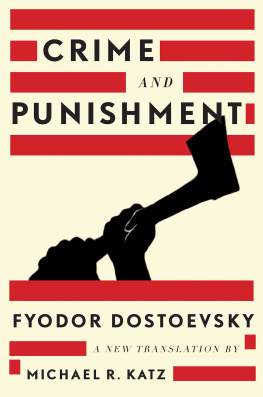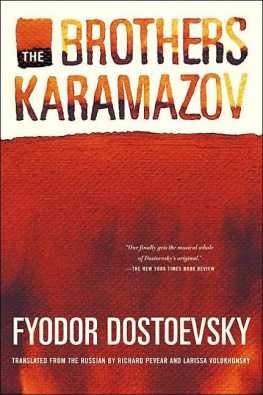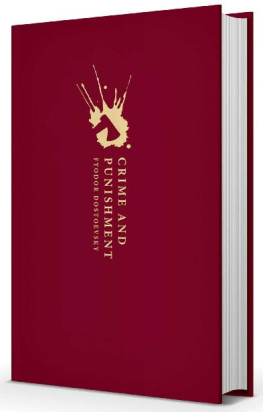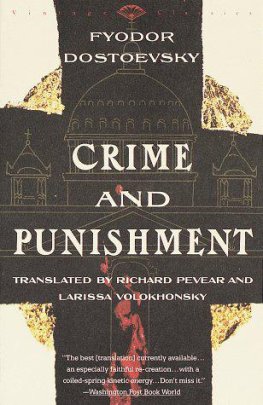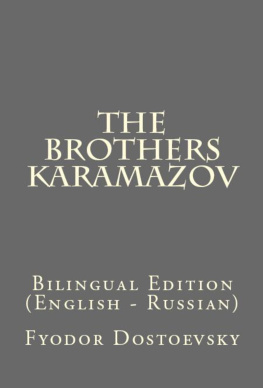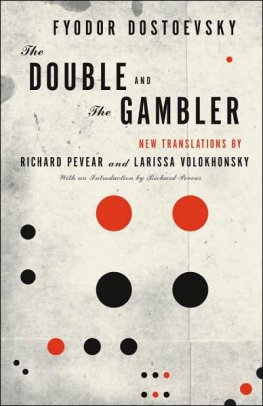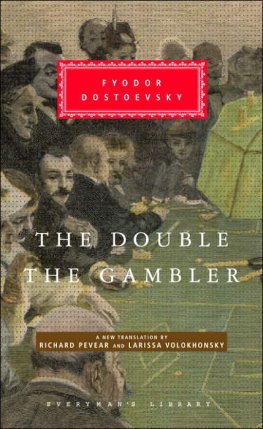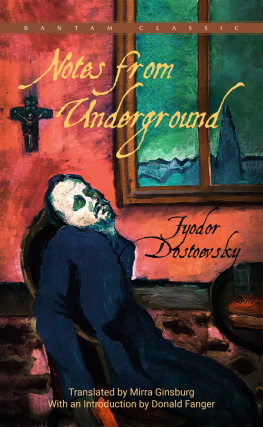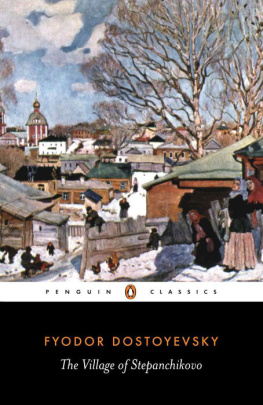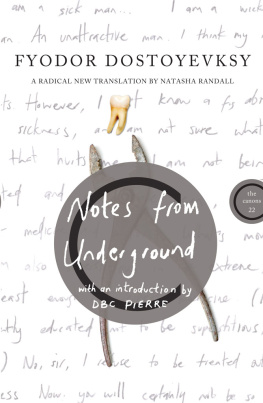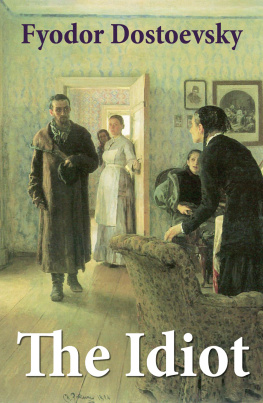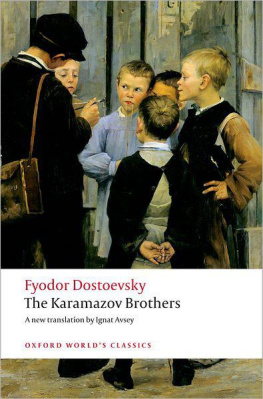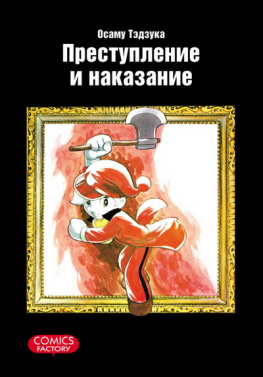Fyodor Dostoevsky - Notes from Underground
Here you can read online Fyodor Dostoevsky - Notes from Underground full text of the book (entire story) in english for free. Download pdf and epub, get meaning, cover and reviews about this ebook. year: 2004, publisher: Knopf Doubleday Publishing Group, genre: Art. Description of the work, (preface) as well as reviews are available. Best literature library LitArk.com created for fans of good reading and offers a wide selection of genres:
Romance novel
Science fiction
Adventure
Detective
Science
History
Home and family
Prose
Art
Politics
Computer
Non-fiction
Religion
Business
Children
Humor
Choose a favorite category and find really read worthwhile books. Enjoy immersion in the world of imagination, feel the emotions of the characters or learn something new for yourself, make an fascinating discovery.

- Book:Notes from Underground
- Author:
- Publisher:Knopf Doubleday Publishing Group
- Genre:
- Year:2004
- Rating:3 / 5
- Favourites:Add to favourites
- Your mark:
- 60
- 1
- 2
- 3
- 4
- 5
Notes from Underground: summary, description and annotation
We offer to read an annotation, description, summary or preface (depends on what the author of the book "Notes from Underground" wrote himself). If you haven't found the necessary information about the book — write in the comments, we will try to find it.
Notes from Underground — read online for free the complete book (whole text) full work
Below is the text of the book, divided by pages. System saving the place of the last page read, allows you to conveniently read the book "Notes from Underground" online for free, without having to search again every time where you left off. Put a bookmark, and you can go to the page where you finished reading at any time.
Font size:
Interval:
Bookmark:
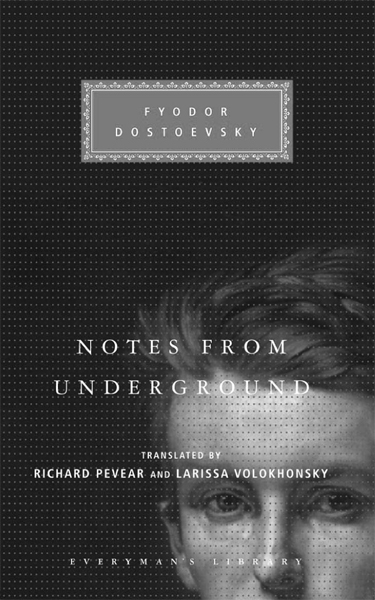
THIS IS A BORZOI BOOK
PUBLISHED BY ALFRED A. KNOPF
Copyright 1993 by Richard Pevear and Larissa Volokhonsky This translation originally published by Alfred A. Knopf, Inc., New York, in 1993 and first published in Everymans Library in 2004. This title first included in Everymans Library, in a different translation, 1913.
Bibliography and Chronology Copyright 2004 by Everymans Library Typography by Peter B. Willberg
All rights reserved under International and Pan-American Copyright Conventions. Published in the United States by Alfred A. Knopf, a division of Random House, Inc., New York, and simultaneously in Canada by Random House of Canada Limited, Toronto. Distributed by Random House, Inc., New York. Published in the United Kingdom by Everymans Library, Gloucester Mansions, 140A Shaftesbury Avenue, London WC2H 8HD.
US website: www.randomhouse/everymans
eISBN: 978-0-307-78464-3
This translation has been made from the Russian text of the Soviet
Academy of Sciences edition, volume 5 (Leningrad, 1973).
A portion of this work was originally published in Epoch.
A CIP catalogue reference for this book is available from the British Library
v3.1_r1
______
______
The ellipsis after the opening sentence of Notes from Underground is like a window affording us a first glimpse of one of the most remarkable characters in literature, one who has been placed among the bearers of modern consciousness alongside Don Quixote, Hamlet, and Faust. What we see is a man glancing at us out of the corner of his eye, very much aware of us as he speaks, very much concerned with the impression his words are making. In fact, we do not really see him, we only hear him, and not through anything so respectable as a window, but through a crack in the floorboards. He addresses the world from that crack; he has also spent a lifetime listening at it. Everything that can be said about him, and more particularly against him, he already knows; he has, as he says in a typical paradox, overheard it all, anticipated it all, invented it all. I am a sick man I am a wicked man. In the space of that pause Dostoevsky introduces the unifying idea of his tale: the instability, the perpetual dialectic of isolated consciousness.
The nameless hero nameless because I is all of us, the critic Viktor Shklovsky suggested is, like so many of Dostoevskys heroes, a writer. Not a professional man of letters (none of Dostoevskys writers is that), but one whom circumstances have led or forced to take up the pen, to try to fix something in words, for his own sake first of all, but also with an eye for some indeterminate others readers, critics, judges, fellow creatures. He is a passionate amateur, a condition that marks the style and structure as well as the content of the book. Where the master practitioner would present us with a seamless and harmonious verbal construction, the man from underground, who literally cannot contain himself, breaks decorum all the time, interrupts himself, comments on his own intentions, defies his readers, polemicizes with other writers. The literariness of his notes and the unliterariness of his style are both results of his heightened consciousness, his hostility to and dependence upon the words of others. Thus the unifying idea of Notes from Underground, embodied in the person of its narrator, is dramatized in the process of its writing. The controlling art of Dostoevsky remains at a second remove.
This man who may be trying to write his way out of the underground, originally read his way into it. At home, he says, I mainly used to read. I wished to stifle with external sensations all that was ceaselessly boiling up inside me. And among external sensations the only one possible for me was reading. Reading was, of course, a great help it stirred, delighted, and tormented me. That was during his youth, in the 1840s. He read, he dreamed, and he engaged in little debauches. These were his three diversions, and it is interesting that he puts them together. What did he read? At various points in his account he compares himself with Byrons Manfred, with characters from Pushkin and Lermontov all romantic figures. He refers more than once to Rousseau. Farther in the background, but looming large, stand Kant and Schiller, representing German philosophical and poetic idealism, summoned up in the phrase the beautiful and lofty, which had become a commonplace of Russian liberal criticism of the 1840s. His reading was, in other words, that of the typical educated Russian of the time. Reading nourished his dreaming, and even found its way into his little debauches in exactly the proportion required for a good sauce. And so it was that he evaded the petty squalor and inner anguish of his daily life; so it was, as he confesses sixteen years later, that he defaulted on his life through moral corruption in a corner. One main thematic strand of the book is the underground mans denunciation of the estranging and vitiating influence of books, so that from his perspective of the 1860s, when he begins to write, the word literary has become one of the most sarcastic he can utter. To all the features for an antihero purposely collected in Notes from Underground there are added all the features for an antibook.
That book is the underground mans book, not Dostoevskys, though the two coincide almost word for word. Indeed, the sharp personality of the underground man, the intensity of his attacks and confessions, the apparent lack of critical distance in the first person narrative, have given many readers the impression that they have to do here with a direct statement of Dostoevskys own ideological position, and much commentary has been written on the book in that light. Much has also been said about the tragic (or at least terribly sad) essence of its vision. Both notions seem to overlook the humor stylistic, situational, polemical, parodic that pervades Notes from Underground. Dostoevsky certainly put a lot of himself into the situations and emotions of his narrator; what distinguishes his book from the narrators is an extra dimension of laughter. Laughter creates the distance that allows for recognition, without which the book might be a tract, a case history, a cry of despair, anything you like, but not a work of art. Notes from Underground has been called the prelude to the great novels of Dostoevskys last period, and it is so partly because here Dostoevsky first perfected the method of tonal distancing that enabled him to present characters and events simultaneously from different points of view, to counter empathy with intellection.
The underground mans book is a personal outpouring harsh, self-accusatory, defiant, negligently written, loosely structured a long diatribe, followed by some avowedly random recollections (I will not introduce any order or system. Whatever I recall, I will write down.) It claims to be genuine, if artistically crude. No longer literature, but corrective punishment, the narrator finally decides. Nietzsche thought he could hear the voice of the blood in it.
Dostoevskys novel is something quite different. It is a tragicomedy of ideas, admirable for the dramatic expressiveness of its prose, which gives subtle life to this voice from under the floorboards with all its withholdings, second thoughts, loopholes, special pleadings; and admirable, too, for the dynamics of its composition, the interplay of its two parts, which represent two historical moments, two climates of opinion, as well as two images of the man from underground, revealed by different means and with very different tonalities.
Font size:
Interval:
Bookmark:
Similar books «Notes from Underground»
Look at similar books to Notes from Underground. We have selected literature similar in name and meaning in the hope of providing readers with more options to find new, interesting, not yet read works.
Discussion, reviews of the book Notes from Underground and just readers' own opinions. Leave your comments, write what you think about the work, its meaning or the main characters. Specify what exactly you liked and what you didn't like, and why you think so.

